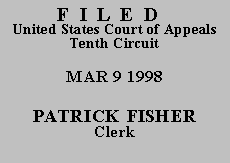

|
JOHN HERRERA,
v.
TIM LEMASTER, Warden, New
Mexico State Penitentiary;
ATTORNEY GENERAL FOR THE
STATE OF NEW MEXICO |
|
Before BALDOCK, EBEL, and MURPHY, Circuit Judges.
John Herrera, proceeding pro se and in forma pauperis, seeks a certificate of appealability to appeal the district court's denial of habeas corpus petition brought pursuant to 28 U.S.C. § 2254. See 28 U.S.C. § 2253(c)(1)(A) (providing that "[u]nless a circuit justice or judge issues a certificate of appealability, an appeal may not be taken to the court of appeals from the final order in a habeas corpus proceeding in which the detention complained of arises out of process issued by a state court"). Because Herrera has failed to make "a substantial showing of the denial of a constitutional right," we deny Herrera's request for a certificate of appealability and dismiss the appeal. See id. § 2253(c)(2) (certificate of appealability will issue only upon substantial showing of denial of constitutional right); Barefoot v. Estelle, 463 U.S. 880, 893 & n.4 (holding that a petitioner can make a substantial showing of the denial of constitutional right by demonstrating that the issues raised are debatable among jurists, that a court could resolve the issues differently, or that the questions deserve further proceedings).
Upon de novo review of Herrera's application for a certificate of appealability and brief, the magistrate judge's Report and Recommendation, and the entire record on appeal, this court concludes that Herrera has failed to demonstrate that the district court's resolution of his petition is debatable or is reasonably subject to a different outcome on appeal to this court. This same review leads us to conclude that none of the issues raised by Herrera are deserving of further proceedings. Because Herrera has not made a substantial showing of the denial of a constitutional right, this court DECLINES Herrera's request for a certificate of appealability and DISMISSES this appeal.
ENTERED FOR THE COURT
Michael R. Murphy
Circuit Judge
*. This order and judgment is not binding precedent, except under the doctrines of law of the case, res judicata and collateral estoppel. The court generally disfavors the citation of orders and judgments; nevertheless, an order and judgment may be cited under the terms and conditions of 10th Cir. R. 36.3.